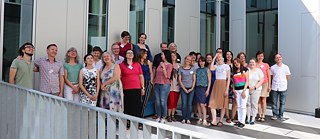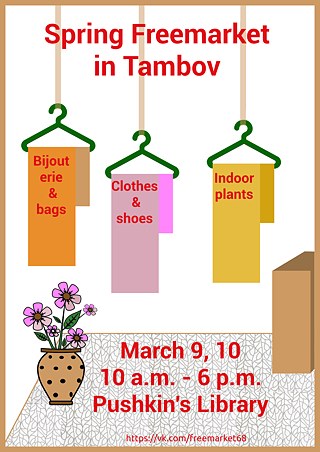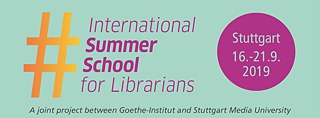International Summer School
Creative ways to improve the quality of life in cities

How can libraries help achieve the United Nations’ Sustainable Development Goals? Following its International Summer School, the Goethe-Institut has awarded prizes to three projects in Russia and Ukraine that address social and ecological issues.
By Patrick Wildermann
Tetiana Marynynich can imagine no better place than a library to promote an ecologically conscious lifestyle. “After all, we have people of all ages coming in to work, study or spend their free time”, explains the director of the State University Library in the Ukrainian city of Sumy. She goes on to say that the younger generation in particular is extremely open to ecological issues – and willing to question their own consumer behaviour or take part in city clean-up campaigns. For example, Marynynich and her team recently organized a “Living without Waste” eco quiz for schools in Sumy, teaching pupils in a fun way about using natural resources responsibly.
International Summer School
The “Green Library Project” run by Sumy University Library is one of three projects that followed the 2018 International Summer School and, in a competition for Goethe-Institut scholarship holders, were awarded prizes and a financial subsidy.Entitled “Socially Committed, Innovative, Accessible to all: Libraries of the Future contribute to the United Nations Agenda 2030”, the English-language summer school was held at Stuttgart Media University from 23 to 28 July 2018. Its aim was to find out how libraries can help achieve the 17 Sustainable Development Goals (SDGs) laid down in the United Nations’ Agenda 2030.
Imaginative library concepts
Among the speakers at the summer school was Barbara Schleihagen, the executive director of the German Library Association (DBV), who talked about goal 17 (“Strengthen the means of implementation and revitalize the global partnership for sustainable development”) in the module on “Lobbying and Advocacy: How to Bring Libraries Forward”. She explained which programmes libraries are already implementing in the context of the SDGs – and which activities could be relevant. Rob Bruijnzeels from the Netherlands explored goal 11 (“Make cities inclusive, safe, resilient and sustainable”) in his talk on “Re-designing the Library!”. Bruijnzeels is a member of the “Ministry of Imagination“, a group that supports libraries and other cultural institutions with designing future-oriented concepts.The 30 international participants also included 15 Goethe-Institut scholarship holders from Russia, Ukraine, Belarus, Kyrgyzstan, Uzbekistan, Georgia, Hungary, Egypt and Israel. They had been asked to submit projects from their own libraries that pursue the Sustainable Development Goals.
Waste separation as a model
The “Green Library Project” uses not only information brochures and posters but also clean-up, recycling and waste separation campaigns to promote goal 11. As Tetiana Marynynich explains, it is difficult to find any companies at all that will properly dispose of separated waste – “the necessary infrastructure has not been developed in Ukraine”. Nonetheless, she adds that the project has succeeded in raising awareness about environmental issues, not least at the university itself: “The university administration supports our project and has now provided different bins for waste separation in all departments”, reports Marynynich.A challenge of a quite different nature is being addressed by the project “The Upgrade of the Multi-Sensory Room for Blind and Visually Impaired Children“ in the Russian republic of Udmurtia: over 10,000 blind or visually-impaired people live here, including many children. Although special schools and help centres do exist for them, they are insufficient to meet the demand, reports Anna Semenova, director of the National Library of the Udmurt Republic – “which is why we are expanding our resources in this area of social work”.
Music tables and sand painting
The National Library’s “multi-sensory room”, which has been further modernized thanks to the project prize funding from the Goethe-Institut, provides blind and visually-impaired children with a whole host of individual learning modules and group programmes – including a participatory game entitled “A journey to the Land of Tales”. Based on works by the Russian poet Korney Chukovsky, it gives the young participants a playful introduction to his characters. “A music table for children up to three years old is also particularly popular; it attracts their attention by generating different kinds of sound”, explains Semenova. At another table the children can do sand drawings, which fosters their imagination and creativity.Promoting social engagement

International Summer School 2019 on the “Digital Transformation”
The International Summer School 2019 will be held at Stuttgart Media University from 16–21 September 2019. A joint project of the Goethe-Institut and Stuttgart Media University, it is designed for students of library and information science (LIS) and LIS practitioners.
The summer school provides an opportunity for exchange with international colleagues. Four modules will be run (in English), addressing various aspects of the digital transformation.
For more detailed information and a link for registration, please visit the Stuttgart Media University website:
www.hdm-stuttgart.de
